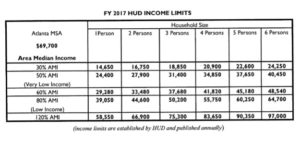Atlanta City Council passes Monumental Affordable Housing Policy
On November 20, the Atlanta City Council unanimously approved legislation championed by Councilmember Andre Dickens that will require developers building new residential rental units near the BeltLine to set aside a portion of those apartments for low and moderate-income renters. The policy specifically requires that either 10% of the apartments be affordable to renters earning up to 60% of Area Median Income (AMI) or that 15% of the apartments be affordable to renters earning up to 80% of that number. Developers also have the option to pay a fee in-lieu of providing affordable apartments in their development—the cost of the fee varies depending on the location along the BeltLine (and the funds collected will be used to develop affordable housing within the same area). Under federal guidelines, affordability is defined as 30% of a household’s monthly income. For example, an apartment affordable to a 2-person household earning 60% of Area Median Income would need to rent for $930 or less. (See Income Limit table below for more detail).
Inclusionary Zoning policies can be complex and technical, but they are one of the many tools that city governments can use to create affordable housing options in high-cost areas. As all Virginia-Highland residents know, the BeltLine has been an impetus of change across the city and has invited new investments into our communities. While these changes are exciting and offer residents new amenities and opportunities for recreation, they cause an upward pressure on housing prices and rental rates, making it difficult for everyone to benefit from this public amenity. The Atlanta BeltLine is a public investment that all neighborhoods bought into, and all neighborhoods and neighbors have a right to live along it. Councilmember Andre Dickens’ legislation is the first step towards ensuring that affordable housing options remain available in these communities.
This legislation will impact Virginia-Highland directly particularly as new development comes to the Ponce de Leon Place corridor. All residential developments in the “BeltLine Overlay District”—a corridor extending about a half-mile in each direction from the trail—that comply with the affordability requirement are entitled to a 15% density bonus, are exempt from minimum parking requirements for residential development, and receive priority review of their permit applications, among other incentives.

Atlanta is one of hundreds of cities that has implemented Inclusionary Zoning across the country, but is one of the first in the Southeast to successfully pass such an ordinance. This is a significant achievement for our changing city, but it is only the first step to ensuring a neighborhood and city that are affordable to all.
Atlanta’s Mandatory Inclusionary Zoning ordinance was recommended unanimously by all Neighborhood Planning Units (NPU) in the city, including NPU-F. For more information about this ordinance see: http://andredickens.com/atlanta-city-council-approves-landmark-mandatory-inclusionary-zoning-legislation/ or http://www.reporternewspapers.net/2017/11/21/atlanta-city-council-passes-beltline-inclusionary-
Submitted by Emma Tinsley, VHCA Board Member